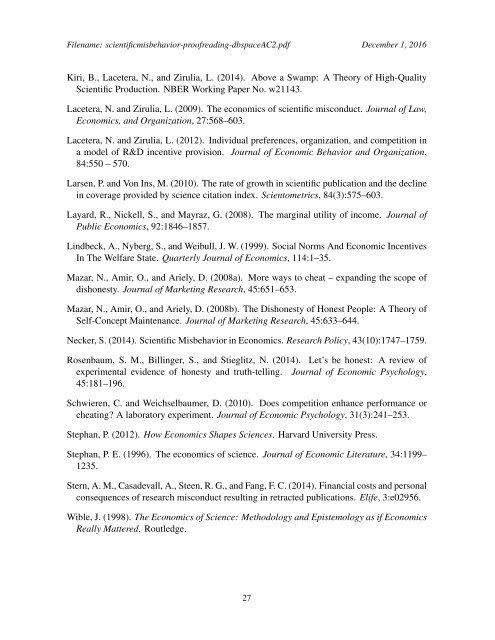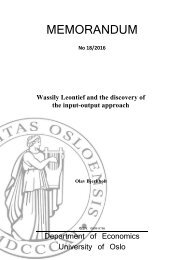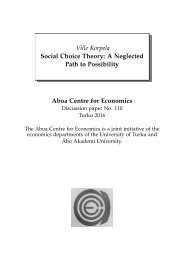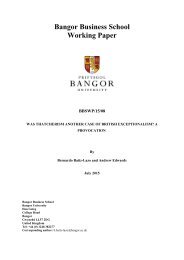Cheat Perish? A Theory Scientific Customs
n?u=RePEc:tut:cccrwp:2016-03-ccr&r=hpe
n?u=RePEc:tut:cccrwp:2016-03-ccr&r=hpe
Create successful ePaper yourself
Turn your PDF publications into a flip-book with our unique Google optimized e-Paper software.
Filename: scientificmisbehavior-proofreading-dbspaceAC2.pdf December 1, 2016<br />
Kiri, B., Lacetera, N., and Zirulia, L. (2014). Above a Swamp: A <strong>Theory</strong> of High-Quality<br />
<strong>Scientific</strong> Production. NBER Working Paper No. w21143.<br />
Lacetera, N. and Zirulia, L. (2009). The economics of scientific misconduct. Journal of Law,<br />
Economics, and Organization, 27:568–603.<br />
Lacetera, N. and Zirulia, L. (2012). Individual preferences, organization, and competition in<br />
a model of R&D incentive provision. Journal of Economic Behavior and Organization,<br />
84:550 – 570.<br />
Larsen, P. and Von Ins, M. (2010). The rate of growth in scientific publication and the decline<br />
in coverage provided by science citation index. Scientometrics, 84(3):575–603.<br />
Layard, R., Nickell, S., and Mayraz, G. (2008). The marginal utility of income. Journal of<br />
Public Economics, 92:1846–1857.<br />
Lindbeck, A., Nyberg, S., and Weibull, J. W. (1999). Social Norms And Economic Incentives<br />
In The Welfare State. Quarterly Journal of Economics, 114:1–35.<br />
Mazar, N., Amir, O., and Ariely, D. (2008a). More ways to cheat – expanding the scope of<br />
dishonesty. Journal of Marketing Research, 45:651–653.<br />
Mazar, N., Amir, O., and Ariely, D. (2008b). The Dishonesty of Honest People: A <strong>Theory</strong> of<br />
Self-Concept Maintenance. Journal of Marketing Research, 45:633–644.<br />
Necker, S. (2014). <strong>Scientific</strong> Misbehavior in Economics. Research Policy, 43(10):1747–1759.<br />
Rosenbaum, S. M., Billinger, S., and Stieglitz, N. (2014). Let’s be honest: A review of<br />
experimental evidence of honesty and truth-telling. Journal of Economic Psychology,<br />
45:181–196.<br />
Schwieren, C. and Weichselbaumer, D. (2010). Does competition enhance performance or<br />
cheating? A laboratory experiment. Journal of Economic Psychology, 31(3):241–253.<br />
Stephan, P. (2012). How Economics Shapes Sciences. Harvard University Press.<br />
Stephan, P. E. (1996). The economics of science. Journal of Economic Literature, 34:1199–<br />
1235.<br />
Stern, A. M., Casadevall, A., Steen, R. G., and Fang, F. C. (2014). Financial costs and personal<br />
consequences of research misconduct resulting in retracted publications. Elife, 3:e02956.<br />
Wible, J. (1998). The Economics of Science: Methodology and Epistemology as if Economics<br />
Really Mattered. Routledge.<br />
27





